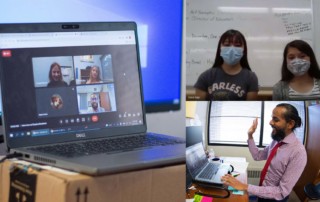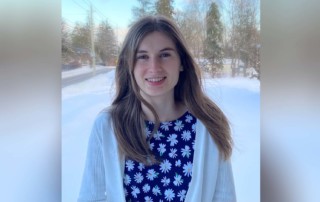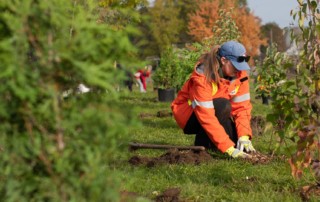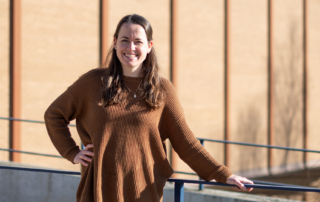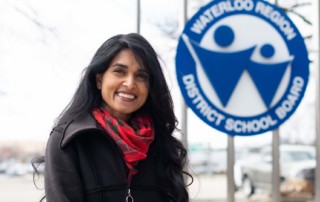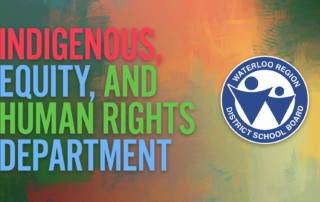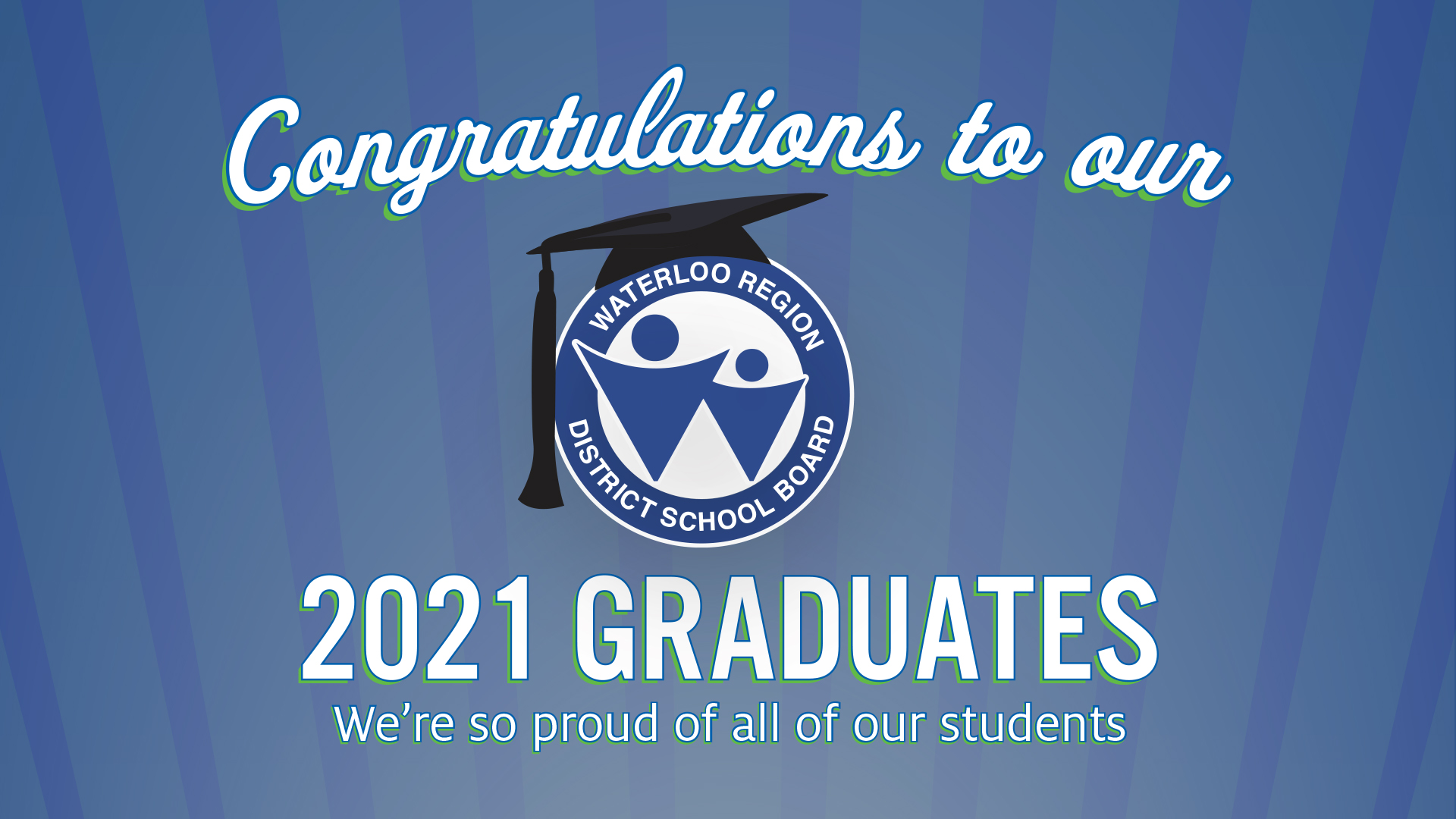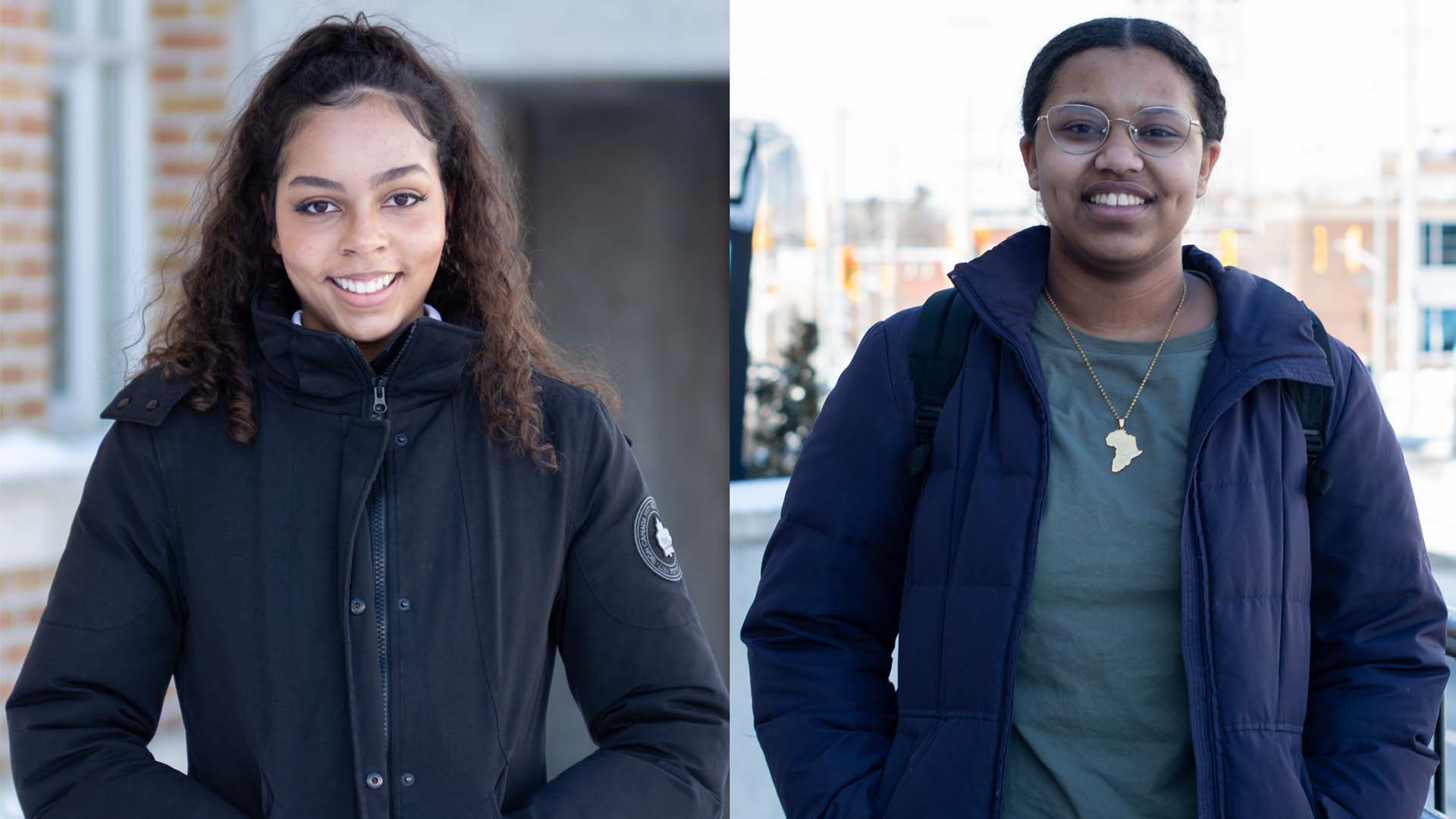Our students are first – each and every one
Our students experience a sense of belonging in a caring and inclusive learning environment that addresses their well-being.
We are committed to honouring and respecting all of our students by creating an environment where they feel included, valued and treated with dignity. School-based safe caring and inclusive school teams support the promotion of a positive school climate within our schools and community.
An important part of this work is centring on and focusing student voice. Our Student Trustees, Kenzy Soror and Nicole Vishkin, play an important role in representing every WRDSB student on our Board of Trustees. They help to bring the student perspective to issues that impact our schools and student learning each and every day. This has become even more valuable as the challenges to students multiplied during the global pandemic.
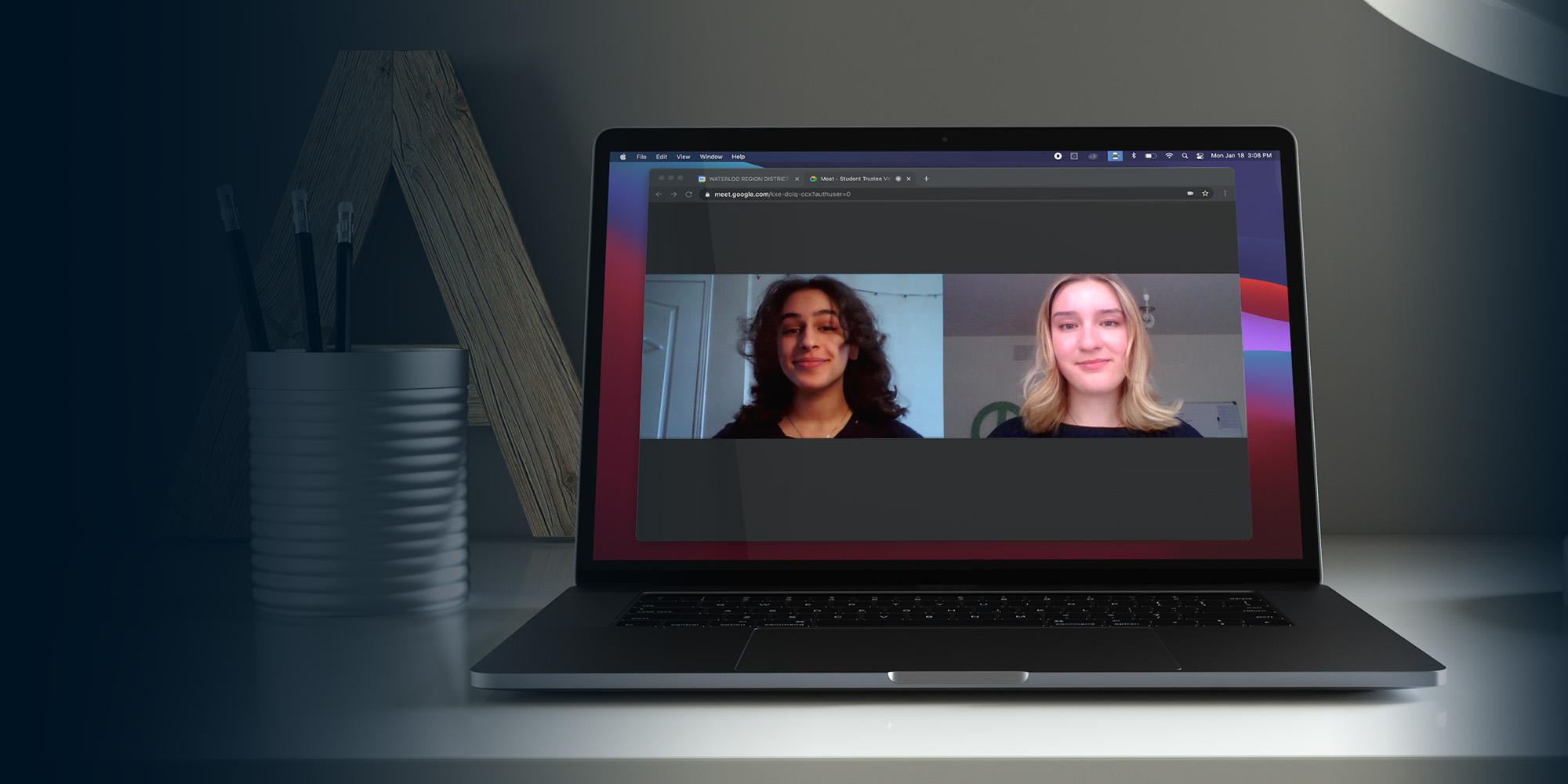
Our students pursue individual learning pathways that reflect their interests, develop skills for the future and inspire global citizenship.
We believe that schools and staff have an important role to play in innovating the future through the way we are educating our students today. The future is full of new possibilities and advancements, and we want to ensure that our students are prepared for the realities of what the workforce and our world may look like after they graduate. We want to support students in developing critical thinking and independent learning skills that prepare them for their futures.
Director of Education jeewan chanicka had the chance to meet with a few junior journalists to answer their questions and talk about their hopes for the future of education. Students from Empire Public School and Country Hills Public School asked about the role of director, and what chanicka’s goals for the role are.
As part of preparing students for this world, and their future in it, chanicka sees opportunities for students to focus their learning on answering big questions that are connected to real-world issues.
Our students succeed in reaching their potential and graduating from WRDSB High Schools and Programs.
Through the introduction of new technology, special programming and customized support, we build students’ confidence as they face the future. It is important to us that every student experiences a caring learning environment that encourages their success. When a student’s optimal learning potential is affected by behavioural, communicative, intellectual or physical exceptionalities, special education support is provided.
Dina Orucevic, a Grade 12 student at Kitchener-Waterloo Collegiate and Vocational School (KCI), wasn’t always confident in her abilities in STEM, but that changed when she took part in a contest offered at her school. This started her on a path that would eventually see her receive a Schulich Leader Scholarship, valued at $100,000.
As she prepared to take on her next adventure, studying Systems Design Engineering at the University of Waterloo, Orucevic shared some words of wisdom for future students who are looking to follow their interests and build a foundation for success.
“I would just say…stay positive, stay motivated, stay passionate,” said Orucevic. “Whatever you put your mind to, you’ll be able to do.”
Our culture of innovation builds students’ confidence and success as they face the future
Our learning environments include all students and their diverse perspectives and ideas
We celebrate the contributions from our diverse community of staff and students. Supporting these perspectives in our schools is an important part of student achievement and well-being.
Our Equity and Inclusion Policy underscores our commitment to providing inclusive programs, curriculum and services. We strive to create an environment for our students and staff that values independence, dignity, inclusiveness and respect. We are continually making improvements to remove barriers in our schools so that all students and staff experience a sense of belonging.
Chris Ashley, a history teacher at Kitchener-Waterloo Collegiate and Vocational School (KCI), exemplifies this focus in his approach to teaching history. Ashley’s classroom was never a place where you would receive the traditional, Euro-centric version of history. “You’re going to get more of a people approach, rather than military approach,” he said.
Students often remark how many new, different parts of history they learn as a result of this method. It fills in the gaps and offers new perspectives on events and time periods already covered in many history courses.
“The more you learn, you realize, there is more to learn,” said Ashley.
Our students, staff and community are supported by creative and collaborative problem-solving.
Whether it is high tech innovation, or social innovation that is changing our society and communities to become better places to live, work and raise a family – we know our purpose as a public school district is to inspire our students to see the potential in themselves to contribute in a meaningful way to their community.
Avenue Road Public School and Manchester Public School in Cambridge saw the power of community when volunteers from Sustainable Waterloo Region (SWR), Energy+, EY Canada and the Ages Foundation came together to plant 170 trees in November.
The microforesting efforts at the two schools will bring new life to these greenspaces, and enhance their ability to help fight climate change.
“Trees and microforests provide a number of benefits,” said Taylor. “Trees through their lifetime will suck carbon out of the atmosphere, they provide habitat for insects and small animals and they help with runoff.”
Beyond the welfare of the environment, these spaces will provide enhanced learning opportunities for students, and more teaching options for the staff at the schools. Taylor hopes that these spaces will provide the basis for building relationships with and understanding nature.
Our school communities are encouraged to learn by exploring new and innovative projects, ideas and approaches.
From Kindergarten through to Grade 12, we are innovating the way we teach and learn, so that our students can become the next generation of innovators. We foster a culture where new ideas are welcomed and considered. We want to build our student’s capacity to think critically and problem-solve creatively.
Ashley McCarl Palmer embodies this spirit in her approach to teaching physics to students at Waterloo Collegiate Institute (WCI). McCarl Palmer made three major shifts in her approach over the past five years: She has gone gradeless in her approach to assessment, she has expanded her students’ physics toolkits and she has adopted “thinking classroom” strategies.
Her innovation was recognized with the 2021 CAP Award for Excellence in Teaching High School/CEGEP Physics (Ontario). Presented by the Canadian Association of Physicists (CAP), the award recognizes excellence in teaching physics in Canadian high schools.
“To be included in their circle was a pretty high honour,” said McCarl Palmer.
Our staff, families and caregivers are partners in every student’s learning journey
Our families and caregivers are supported in creating the best possible outcomes for our students
We know that our families are partners with us in every student’s learning journey, and we are committed to working together, to ensure that every student in the WRDSB is supported in achieving their full potential.
The WRDSB’s Black Brilliance work, involving both former and current students and staff, in addition to community members and groups like the Black Brilliance Advisory Council, showcases this commitment in action. This effort was recognized by Laura Mae Lindo, MPP for Kitchener Centre, as part of the Black Excellence in Leadership Academy (BELA) awards.
Deepa Ahluwalia, Human Rights and Equity Advisor was also recognized individually, for her sustained effort to keep attention on the important work of addressing systemic racism.
“It takes these leaders in the system to be able to do this work,” said Lindo while presenting the award. “That is what you’re doing Deepa, each and every day.”
Our staff is equipped with the skills and resources to support every child in their learning journey.
By embracing an attitude of care and support, we seek to understand and meet the needs of those who we serve. Through reaching out and listening to our community, families and educators, we build collaborative relationships to achieve common goals. Our staff is committed to working collaboratively to advance student achievement in the classroom.
In support of this commitment, the WRDSB was excited to announce the launch of the Indigenous, Equity and Human Rights Department in June of 2021. Within this department, there are three branches: Indigenous Education, Equity and Inclusion, and Human Rights.
The Indigenous, Equity, and Human Rights Department (IEHR) engages with students, staff, and community partners. As a department, their role is to provide support, informed advice, and monitoring for the development of an equity focussed culture that is rooted in human rights and recognizes Indigenous perspectives.
Our staff is supported in their wellness as they promote and model wellness for our students
Every student is entitled to beneficial learning environments. We know that students succeed when they feel safe and supported in school. A healthy school climate leads to greater student success. That is why we embrace an attitude of care and support, especially when it comes to our students and staff.
To support staff as we all navigate an increasingly challenging time, we continue to offer staff a number of resources to support their wellness. In 2021, we introduced a new employee and family assistance plan (EFAP), which offers confidential support for staff and their families 24/7, 365 days a year. The EFAP also provides a library of articles, podcasts, tools and resources for when staff are looking to learn more about how to support their wellness.
Additional wellness resources are offered through the LifeSpeak video library. It has over 300 videos on a range of topics to help improve both physical and mental health. Accessible from anywhere, and at any time, these videos feature leading subject-matter experts to help guide WRDSB staff in supporting their wellness.
Begun in response to the COVID-19 pandemic in March 2020, we continue to publish Supporting Ourselves, Supporting One Another – a publication shared with all WRDSB staff that contains a selection of resources on a variety of topics including mental health and well-being. Through a year where the ability to meet in-person has been limited, this offered a way to continue supporting staff learning and development with relevant, and current resources.

